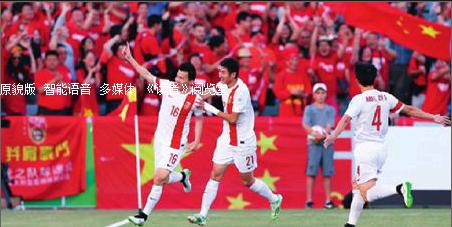REVIVING THE BEAUTIFUL GAME
2015-05-26ByYINPUMIN
By+YIN+PUMIN


With China seeing its economy take off and its national strength grow, it is now turning its sights to something else close to its peoples hearts—football.
On March 16, the State Council, Chinas cabinet, issued an ambitious reform plan aiming to overhaul the countrys football management system in the hopes that the middle kingdom can finally achieve World Cup recognition.
The 50-point plan passed in late February by Chinas leading group of central reform, chaired by President Xi Jinping, outlines a reform that will involve almost every aspect of the sport, including the management, clubs, leagues, national teams and construction of playing fields.
It is widely seen that the plan showcases the Central Governments determination to meet the need to popularize the sport across the country and finally improve the level of its national teams.
“Revitalizing football is a must for building China into a sports powerhouse and also an earnest desire of the nations many fans,” said the plan, named the Overall Plan of Chinese Football Reform and Development.
Goals are set in the plan that include a midterm goal of returning the womens team to their previous status as some of the best in the world—they previously won the AFCs Womens Asian Cup seven tournaments in a row from 1986 to 1999, as well as placing second in the 1999 womans World Cup. The more ambitious long-term goals are for the mens team to enjoy the same status as well as making a bid to host the World Cup.
Zhang Lu, a veteran football commentator based in Beijing, believes that the reform plan provides the foundations for healthy development of football in China.
“The plan summarizes the developing path of football in China in the past 20 years and outlines a direction for the sport in the future. It shows a true understanding of the sport by the central authorities,” Zhang said.
Wang Dazhao, another Beijing-based sports commentator, said that the importance of football development transcends the playing fields and may serve as the impetus for other social and economic reforms in China.
“Football, as the worlds most popular sport, can drive economic growth and encourage social participation in China. Its development will also boost the countrys cultural soft power,”Wang said.
Breaking the bind
Football was chosen by the country to be its icebreaking professional sport in 1994. However, Chinese football has shown little noticeable improvement over the two decades since.
Measures that have proven effective in other parts of the world have been ineffective in China. In particular, a series of scandals like match fixing and gambling has given Chinese football a bad name among fans.
One number can be used to summarize the woeful story of the sport of football in China: 83. This number is the current global ranking for the countrys national mens team by the Fédération Internationale de Football Association (FIFA), the sports global governing body.
The Chinese mens team has qualified only for the FIFA World Cup finals once, back in 2002, when the team was eliminated at the group stage without scoring a single goal.
Since then, the Chinese team has continued to fare poorly despite efforts to bring in world-class coaches like Bobby Houghton and ex-Real Madrid manager Jose Antonio Camacho.
On the womens side, the national team is also facing an uphill battle to recapture the glory of their 1999 World Cup second-place peak, failing to even qualify for the 2011 event.
The womens team now ranks 13th in the world, down from the Top 10 just a decade ago.
The stalled development of Chinese football is often blamed on a history of corruption, bureaucratic red tape and weak efforts at cultivating talented youth.
“The key obstacle to Chinas progress in football is its current management system,” the General Administration of Sport of China (GAS) said in a statement released on March 16.
Wang, the commentator, agreed. He said that the lack of regulation and supervision of the football management authority have given rise to corruption in the sector, which in the long term would hurt the sports reputation and the publics confidence in Chinas football program.
He has likewise proposed legislation to define the role and responsibilities of the Chinese Football Association (CFA) to prevent abuses of power.
“The management of the CFA is constantly reshuffled, which prevents consistent long-term policymaking. The absence of football professionals in management has also given rise to unreasonable policies that are inconsistent with the needs of the sports development,” said Ma Dexing, deputy editor of the Changsha-based newspaper Titan Sports.
In the newly released football reform plan, one important feature is streamlining the widely criticized and counterproductive management system.
The reform will sever the ties between the semi-administrative CFA from the GAS, which is now managing the association with its own officials, and make the former a full-fledged nongovernmental organization with the power to independently determine its manpower and financial requirements.
The association will carry no administrative rank, and will be made up of professional football players and representatives from the sports authorities under the State Council to ensure the bodys professionalism.
Meanwhile, the CFA will hand its decisionmaking power to a reshuffled league council to be formed by shareholders from domestic league clubs and one CFA representative. Professional leagues will raise their management standards and be open to marketeconomy practices.
Tan Jianxiang, a professor of sports sociology at Guangzhou-based South China Normal University, said that the new measures will help club owners gain some crucial rights, while making the CFA work only as a supervisor and supporter.
Wang, the Beijing-based sports commentator, believes the move may signal the beginning of an overall reform of Chinas sport management that will reduce administrative interference and allow more room for the sectors professional development.
“There has been heavy government intervention in the sector and professionals have little say in the sports development. The new plan will allow professionals to build and direct the system used in the future,” noted Wang.
Popularizing the sport
Once regarded as unattainable dreams, hosting and eventually winning the football World Cup have become serious goals for China under the newly-released plan.
“Along with our long-term plan to improve the environment for football and popularize the sport, China should aim to host the World Cup,”said Cai Zhenhua, President of the CFA, at a press conference on March 16.
Meanwhile, Cai commented that the significance of the plan is not only in striving for glory but also to further popularize the sport in China. “By hosting the biggest football event in the world, we can bring football culture to more people, and introduce more and more people to the worlds most popular sport,” added Cai.
In fact, a big emphasis in the plan is to get the countrys youth involved by expanding football education and playing at schools and universities.
China may have the worlds largest number of football fans, but the number of professional football players is tiny in comparison. A report by China Youth Daily said that the entire country has less than 30,000 registered teenage football players, while the number in Tokyo alone is more than 60,000.
“Success in football is directly correlated with the population of regular players,” said Wang Jianlin, Chairman of Dalian Wanda Group, the owner of a former Chinese top-flight football club. “Maybe one out of every 10 kids involved in football has the caliber to become a professional player.”
According to the reform plan, the total number of elementary and middle schools featuring football will increase from the current figure of around 5,000 to 20,000 in 2020 and 50,000 in 2025, with the goal of cultivating more than 100,000 youth players.
In fact, some local governments are already competing with one another to make their own ambitious plans for the development of football.
For example, central Chinas Hubei Province reportedly plans to establish 550 to 650 football schools in the next three years, while Beijing could build up to 200 such schools. East Chinas Jiangsu Province, even more ambitiously, plans to establish 1,000 such schools in five years.
On March 10, education authorities in Shanghai announced the launch of a new program to boost the popularity of football in schools.
The aim of the “campus football” initiative is to boost interest in the game among primary and high school students, while also building the necessary infrastructure to support its development, the Shanghai Education Commission revealed.
As well as nurturing talent, the program, which will run across 1,500 schools, will offer sports teachers and would-be referees the opportunity to go on professional coaching courses, and also provide encouragement for fan clubs and cheerleading squads.
“Applying more professional techniques and practices is bound to encourage more people to get involved in football,” said Shao Bin, a physical education teacher at the No.2 Penglai Road Primary School in the citys Huangpu District.
Still, the lack of adequate football coaches and facilities is hampering the games development on campuses, which require more support from the CFA, suggested Li Chunman, an Asian Football Confederation-licensed football lecturer.
“The CFA shouldnt be hands off. Instead, it should offer technical training to physical education teachers to guarantee that students are coached in the best way possible,” Li said.
To that effect, a national program plans to train 6,000 school football coaches with help from the CFA by the end of 2015.
Meanwhile, a four-tier campus league system initiated by the Ministry of Education, which includes a broad range of ages from primary schools to colleges nationwide, will kick off its inaugural season this autumn to replace previous competitions organized by the CFA and regional sports bureaus to engage more children, said Wang Dengfeng, Director of the ministrys Physical Education, Health and Art Department.
Football courses have been added to primary and secondary schools mandatory physical education programs in pilot areas such as Beijing and Jiangsu under a revised curriculum.
Students football level as a specialty will be counted as part of their overall performance assessment and become an important reference in college admission, Wang Dengfeng said.
According to a regulation published by the Beijing Commission of Education last year, football skills will be included in the physical education test for senior high school entrance exams from 2016 in Beijing.
Han Zheng, a physical education teacher from the Middle School Attached to the Beijing University of Petroleum, was impressed by the curriculums appeal to students.
“The core philosophy of the curriculum and the biggest advantage it has compared to other courses is that it aims to keep children on the field by getting them to enjoy themselves, not grueling workouts,” he said.
“The plan is great for children to take part in the sport and give their parents confidence. The future of the sport will get better each day,”said Sun Ke, a player with the Chinese National Football Team.
Japan-based Sankei Shimbun even cited a British poll to say 7,000 stars like Lionel Messi could emerge across China if the reform was properly implemented.
“The development of Chinese football must be a long process,” said Cai with the CFA. “As the plan said, we should make efforts to let more people take to the sport and let the culture of football take root among the people.”
In the plan, all organizations, from schools to corporations, are encouraged to set up their own football teams and to stage amateur games. A sports lottery will be used to increase investment in boosting football, and two more football training centers at the national level will be established, the plan said.
